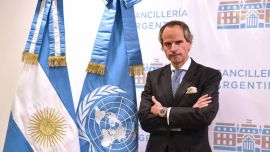But just as Trump’s tour of Japan, South Korea, China, the Philippines and Vietnam comes along with one redefinition after another (as well as arms and technology contracts), Macri’s roadshow aimed to install by sheer repetition a fresh narrative as to the new course of Argentine foreign policy. That on top of sowing the seeds of business with financiers on a par with Stephen Schwarzman, the head of private equity firm Blackstone, energy investors, the Number One of Coca-Cola, the two Rosses (realtor Stephen, head of The Related Group on the one hand and Secretary of Commerce Wilbur on the other) and Mr Jack Rosen, pharmaceutical tycoon and chairman of the American Jewish Congress. It remains to be seen what these reap.
And what notions did Macri seek to install? Firstly, that not all business situations are admissible. Thus not even with this visit has Macri managed to revert the anti-dumping tariffs slapped by the US on Argentina biodiesel. So what did he say about that issue? “It’s a conversation between private enterprises, and I must thank Secretary Ross for all his efforts,” adding: “At the end of the day, the United States still needs to import biodiesel, that need is there (waiting); negotiations are on the table and it is a question of which conditions the American private sector is willing to pay.”
On that issue, some voices murmured that the Argentine president had already been tipped off as to the negative outcome for biodiesel. It seems the Trump administration waited until Macri concluded his visit to make its verdict public. A question of good manners.
The end of isolation was another of the foreign affairs leitmotivs sung by Macri during his Big Apple tour.
“Argentina’s foreign policy and its stance in the world? We have to first show the world that we can get rid of populism, which we are doing, and this means quite a lot when in many places of the globe they are going into populism”, he told journalist Charlie Rose during a luncheon at the Americas Society/Council of the Americas. There were smiles in the audience. Was his innuendo meant for Trump or for the neighbourhood’s populist tyrant, Nicolás Maduro? “We need to be a part of the world,” he continued. “Isolation only brings poverty; plus, the millennials want to be part of the world and that brings no discussion at all in terms of future … we need and want free-trade agreements with different blocs and with countries that have open market (policies), like Japan, the Pacific Alliance, the EU,” he stated during his NYC stay. Ideals obviously at odds with Mr Trump’s foreign policy of a blitz raid against free trade and blocs. The Mercosur was another topic to which Macri referred.
Curiously, his commitment to that trade bloc seems to have slackened. Many voices highlight its failure – does Macri share that trend?
“We are not happy at all with Mercosur,” he said. He complained about the red tape that reigns in the bloc and called for more dynamism within and toward other blocs.
“We have to be more dynamic and join the Pacific Alliance as soon as possible,” he added, whereupon he proceeded to virtually sentence Mercosur to death: “Mercosur has been an isolated bloc, with high protectionism and wreaking disaster on both countries (i.e. Brazil and Argentina), increasing the poverty (rate) … We have to reduce protectionism inside the bloc now.”
China’s commercial policies and status as a main trade partner were also addressed during his three days in NYC. “China has had aggressive (policies) in the region, investing and financing a lot with the previous administration,” he said, to immediately add that Beijing had been courageous when investing during the Kirchnerite presidencies.
“It is a great opportunity for both countries” because “we can merge our capabilities,” he added. He later explained that during his administration China passed from signing direct contracts to taking part in tender processes, in order to “clarify prices and relations.” John Miklethwait, Bloomberg’s editor-inchief, asked him the US$64-million question in an interview: Do you see Donald Trump as a free trader?
“Weeeeelll, he is trying to protect local jobs”, Macri responded with a drawl, only to add: “I might not have the same view as he does,” and that “the challenges lie not outside but inside, when it is technology that is destroying jobs.” Miklethwait pulled the trigger yet another time: does the US look more protectionist than the EU or China? “Similar, very similar; [but] at the end of the day, when you sit down at the table, all free traders start taking out cards saying ‘not this’... ‘no, no,’” Macri admitted. “So, what is your advice for Mr Trump?” was Charlie Rose’s last question. “It is difficult to find a better region than South America,” he said, regarding energy, especially renewables, food security and young talented people. “So this is our moment and it would not be very intelligent for the US, which has been the major partner of South America for so many years, to leave that place to China or Japan or any other region,” he stated.
Macri added just one last line, which fully depicts his vision (or foreign policy narrative) of a unified hemisphere with a single market and future. “Today is the moment in which you [meaning the US led by Trump]have to be present, invest in order to develop the region and really establish that the whole continent is stable and a good place to live in the future.” He did not scream “Put your eyes on South America”, but that was the message. In the next few days, the Trump administration would tighten travel and trade ties with Cuba while Wall Street watched with “crooked” (never was that word better used) fascination how Venezuela dived into default. In the meanwhile, the US president, in Beijing, rolled back his rhetoric and signed deals for US$250 billion with President Xi Jinping. No doubt the centre of the world is far away from Buenos Aires, but the good news is that President Macri has at last decided to champion Latin America in the quest for a united hemisphere. The foreign policy route has been recalculated.
(*) Former editor of the Buenos Aires Herald (2010-2013).
























Comments